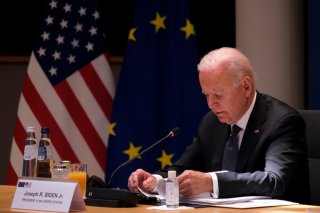The West Must Stop Turning Away Willing Diplomatic Partners
The United States should increase cooperation with Kazakhstan to help keep shared adversaries at bay.
The U.S.-led international system is under attack. Russia’s invasion of Ukraine, Chinese saber-rattling over Taiwan, and war in Gaza are all symptoms of America’s eroding power. At such a time, the United States and its allies need all the help they can get.
The Washington establishment professes to agree with this view but often fails to follow up. Too often, the West will settle for nothing less than paragons of Western liberal democracies in its quest for strategic partners. Promoting democracy and good governance should be a core part of the West’s foreign policy, but this should not come at the expense of its strategic interests and the deterrence of the primary challengers, China and Russia.
The West is needlessly turning away willing partners and handing the long-term strategic advantage to China and Russia, who have no such qualms about working with everyone.
Examples of this strategic folly abound. Nigeria, Africa's most populous and oil-rich country, has made great strides in combatting corruption and liberalizing its economy and politics. For years, it was a U.S. ally in opposing Islamic extremism in the Sahel, most notably against Boko Haram. So, after years of cooperation with the United States, Nigeria found its liberalization “rewarded” with condemnations over press freedoms, backhanded statements over the safety of U.S. nationals in Nigeria, needless diplomatic snubs, and canceled arms purchases.
As Nigeria moved in the right direction, it was not rewarded. So, instead, Nigeria deepened its economic relationship with Beijing. China is now establishing banks, offering political support, and pumping investment into the country—all things Nigeria wanted from the United States, but Washington didn’t deliver.
Nigeria is not a unique case. The expansion of BRICS, increasing China-Saudi cooperation, and the eroding UAE-U.S. cooperation exhibit the same phenomenon where the West snatches defeat from the jaws of victory. However, the most geopolitical-sensitive example can be found in Central Asia.
There, Kazakhstan, a resource-rich country the size of Western Europe, borders Russia and China directly to its north and east. Iran and Afghanistan block southern routes to the wider world, and only a thin “Middle Corridor” connects the nation to the West via the Caspian Sea and Caucasus.
Upon its independence from the Soviet Union, the first President of Kazakhstan, Nursultan Nazarbayev, had a three-point reform agenda to allow Kazakhstan to navigate its rough neighborhood. Firstly, attract Western investment to balance out inevitable Russian and Chinese influence. Secondly, begin a state-building program to mold robust institutions. Lastly, enact a multi-vector foreign policy aiming to make Kazakhstan a diplomatic broker.
Nazarbayev’s reforms largely succeeded. After the 1992 “Deal of the Century” to develop Kazakhstan’s oil alongside Chevron, investment steadily moved into the country. The result: Kazakhstan now has comparable economic freedom to Italy and other EU member states. The economy has grown ten times larger since independence. At the same time, the United States has grown just over three times larger. Kazakhstan has one of the fastest-growing economies in the world, which grew by 5.1 percent in the first half of 2023, higher than initial projections from the IMF.
Nazarbayev’s state-building initiatives created government institutions that support economic and social development. These included moving the capital from Almaty to Astana, addressing the memory of the artificial Soviet-era famine and forced resettlement of nomads, dismantling the world’s fourth-largest nuclear arsenal, and defusing ethnic tensions and repatriating ethnic Russians. De-russification and widespread cultural reforms rapidly transformed Kazakh civil society.
Diplomatically, Kazakhstan has attempted to take an even hand and engage with the West but is constrained by its massive Russian and Chinese neighbors. During the height of the War on Terror, the Congress of Leaders of World and Traditional Religions was initiated by Kazakhstan, and the Astana Process attempted to end the Syrian Civil War. Under Nazarbayev’s successor, President Kassym-Zhomart Tokayev, the country refused to recognize Russia’s sham referendums in occupied Eastern Ukraine and is complying with sanctions against Russia.
One would think that the West endorses Kazakhstan to the hilt. It’s practically the dream strategic partner undergoing political liberalization, interested in economic relations, and bordering both major rivals. They want your cooperation to keep your shared adversaries at bay.
Instead, a series of avoidable disagreements has stymied cooperation between the West and Kazakhstan. Despite its economic reforms, the United States still does not have permanent normal trade relations (PNTR) with Kazakhstan. Despite its cooperation with the West over sanctions, which involve Kazakhstan’s largest trade partner and the world’s longest border, the animating discussion in Washington remains about how some rogue Kazakhs could be facilitating Russia’s war rather than the constructive actions of the Kazakh state.
While the West lectures, it still continues to import Russian oil, albeit indirectly, and purchase Russian gas and uranium.
Western policy often aims for diplomacy, which promotes the “perfect” relationship between civil society and the state, but the perfect is often the enemy of the good. Increasingly arbitrary and impossible standards result in lost opportunities and discouraged allies, much to the delight of Moscow and Beijing.
Ivan Sascha Sheehan is the associate dean of the College of Public Affairs at The University of Baltimore. He previously served as the executive director of the School of Public and International Affairs between 2018-2023.
Image: Shutterstock.com.

